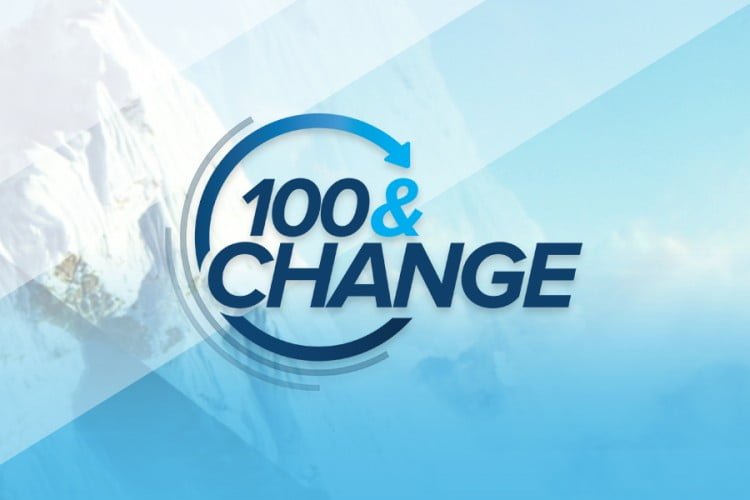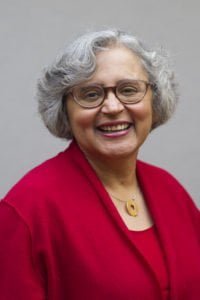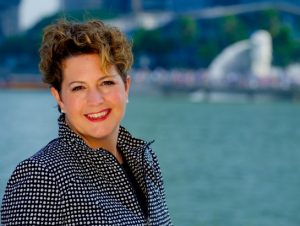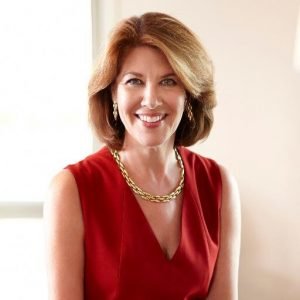
Denver: As regular listeners of the show know, we’ve had the distinct pleasure of covering the MacArthur Foundation’s 100&Change competition over the past year or so including getting to hear from each of the eight semi-finalists. The winner was announced in December, and I thought it’d be worth recapping this extraordinary enterprise starting with the woman who oversaw the whole thing. Cecilia Conrad, the Managing Director of the MacArthur Foundation.
Good evening, Cecilia, and welcome back to the show.
Cecilia: Good evening, and it’s wonderful to be back. Thank you.
Denver: For those tuning in for the first time, just give us a brief overview of 100&Change.

Cecilia Conrad
Cecilia: 100&Change is a MacArthur initiative to identify a problem and solution that $100 million could help either solve or take a big slice of or unlock the resources required to solve it. And we did this in an unusual way. We didn’t define the problem or the domain. We issued an open call to the world and asked tell us what $100 million might do. We opened that call in June 2016. The submissions came in September, October of 2016. Just recently, we announced the recipient of $100 million grant.
Denver: Who was?
Cecilia: Sesame Workshop and the International Rescue Committee who will be using the $100 million for an early childhood intervention program for children in the Syrian refugee region.
Denver: Great stuff. As 100&Change unfolded over the last year or two, were you surprised by anything?
Cecilia: First, I was surprised by the number of submissions that we received. We received over 1900 submissions from around the world on an array of topics and areas. Some of the things I had no idea were major social problems or issues, some with solutions that were quite innovative. There was an amazing range of those projects. The first surprise was to recognize that we had a public resource; this huge database of solutions, and it’s really inspiring to look through those. We have those available. The Foundation Center has a special site that is a “Solutions Bank” from the MacArthur 100&Change project. So we’re hoping that people who are interested in what the ideas are will go and take a look and browse through those projects. That was the first surprise.
The second surprise was the way in which the project, just the call for proposals had an impact beyond the project that ultimately became semi-finalist and then finalist or even the recipient of the grant. We heard from organizations that it gave them an opportunity to think big in a way that they had never thought big before. We’re trying to collect all these what I’ll call externalities, little effects that had happened in an organization, so that was a surprise.
Then the most recent, wonderful surprise was the fact that our board found it so impossible to make a choice that they concluded that they needed to support all four of our finalists. So, in addition to the single $100 million grant, they made grants of $15 million to each of the other three finalists.
Denver: And you were really surprised by that?
Cecilia: Yes, I was. I was thrilled because it was such an expression of first of all, the board’s strong belief in those projects, and I think that was important in communicating to the world, but in particular to other funders, that these are projects worthy of support. We’re starting to see some activity that’s emerging because of that initial; it’s too big to be called a Seed Grant. I’ve been calling it a nest egg; because of that nest egg investment that MacArthur has made.
Denver: That was an absolutely wonderful gesture on the part of your board. I’ll tell you what my surprise was, the eight competitors….the semi-finalists became such good colleagues. I’ve never seen more goodwill between eight people vying for the same prize in my entire life. It just was a very warm experience to see how they cared about each other and how they supported each other; all fiercely competitive, mind you. But it wasn’t what you thought it was going to be. They really liked one another.
Cecilia: That’s true. One of the things that happened with the eight semi-finalists is that we put some investment in capacity building for all eight but that process also involved them working together. We had a workshop where they spent three or four days looking at each other’s project, giving each other feedback, making suggestions about potential sources of funding from their own network. An amazingly generous group of people who all feel passionate about their projects and also came to recognize that they all shared this passion… particularly for vulnerable children.
Denver: I know that you’re undertaking a thorough and comprehensive evaluation of this whole thing.
What are going to be some of the things that you’ll be looking at?
Cecilia: We’ll be looking at every little piece of the competition, from the way we designed it, to the criteria, to our judging process; to make sure that it was as efficient as it could be. To make sure it was as fair and transparent as it could be. One of the questions I’m particularly interested in is taking a look at where we received submissions and where we didn’t. Are there spaces that we didn’t reach; people who didn’t know about the competition who might have had really exciting projects to submit? Are there aspects of our criteria, of our rubric, of our judging process that may have made it more difficult for some fields versus others and to investigate that more thoroughly, so that we understand what any unintended consequences of our prize design might have been.
Denver: I recall when you were first on the show, we discussed prize philanthropy, its tremendous benefits as well as its limitations. Has your thinking changed any about prize philanthropy, its roles and possibilities having lived through 100&Change.
Cecilia: I wouldn’t say that my views have changed. I’ve seen play out some of the concerns about prize philanthropy. It’s part of our review, trying to pay particular attention to the cost burden imposed on participants. Did we provide enough value to make that cost burden worthwhile. So, we’ve been investigating that, and that’s one of the things that we know is a challenge with prize philanthropy – that it does impose a burden on the participants. I think some of the benefits of prize philanthropy – we also seen played out in terms of stimulating conversations, stimulating thinking, stimulating collaboration. So I think that part we’ve also seen played out. Certainly for the foundation, the projects that became our eight semi-finalists and our four finalists were not areas of work that would have been on our radar otherwise. So, I think it did serve the purpose of expanding, getting us beyond our existing network.
Denver: Finally, Cecilia, will the MacArthur Foundation do this again? If so, even at this early stage of reflection, anything you might do a little bit differently?
Cecilia: Yes. We do intend on having another version of 100&Change. Towards the second half of the year, we’ll try and announce more specifics. One of the things that we want to do a little differently is to get a slightly longer launch pad from when we announced the competition to when the submissions are due, to give organizations a bit more time to think about what they want to submit, to reflect, put together partnerships and collaborations than they had in that first iteration. We will, as I said, earlier be looking at every aspect of the competition. I’m not anticipating major changes but there will be tweaks.
Denver: Cecilia Conrad, the Managing Director of the MacArthur Foundation, thanks for taking a few minutes to be with us this evening, and I want to thank you allowing The Business of Giving to be part of this whole thing. I know firsthand that our audience really enjoyed and got a lot of it.
Joining me now on the phone is Bev Postma, the Chief Executive Officer of HarvestPlus, one of the four finalists of 100&Change competition. Good evening, Bev, and welcome back to the show.
Beverley: Good evening, Denver. It’s great to be back.
Denver: For those who may tuning in for the first time, tell our listeners about the project you submitted.
Beverley: Well, it feels like a long time ago now. But just over a year ago, we submitted an application to transform nutrition in Africa using the power of agriculture. Our proposal was that we would hope to reach 100 million people in Africa with more nutritious crops, and we’ll do that by breeding the nutrition back into staple food crops that many rural families are relying on. The name of the project was Scaling Up Biofortification in Africa.
Denver: Having been a part of this competition, Bev, share some of your reflections; maybe some of the benefits that came as a result as well as some of the challenges the organization experienced.

Beverley Postma
Beverley: Well the benefits I must say are too numerous to list. First of all, the benefit is that we came away with $15 million from the MacArthur Foundation which was just unbelievable. We entered the competition to win $100 million, winner-takes-all competition. We were just blown away by the generosity of the MacArthur Foundation when they announced that they would not only be awarding $100 million, a fantastic and very worthy winner, the IRC and Sesame Street, but also awarding $15 million to each of the other three finalists.
Denver: How did you react to that news? It was complete surprise I know.
Beverley: Nobody expected it. I hear even the staff in the MacArthur Foundation weren’t aware of it. Of course, we focused for over a year on bringing in $100 million. Of course, it was a little of initial disappointment that we didn’t make it to the number one spot. But then of course, when the news sunk that we were taking home $15 million that we can spend immediately in Africa to scale up our program. So, it’s been a real mood of celebration.
Denver: How do you plan on using it, leveraging it to support and scale up those programs in your life-changing work?
Beverley: The great news is we’re ready to go. We’ve moved well beyond the pilot stages in six countries in Africa. We have a very proven model of getting these crops into the hands of farming families. So, we’re both going to expand the work in our initial six countries where we’ve had strong operational support from many partners in government for many years. But the great news is that it means we can expand into three or four new countries this year, and we’re working with the MacArthur Foundation to determine exactly which those countries are and to get that action on the ground as soon as possible.
Denver: Fantastic. Thanks, Bev, for being with us and for the remarkable work that HarvestPlus does.
Beverley: Thank you so much.
Denver: With us now is Sherrie Westin, the Executive Vice President of Global Impact and Philanthropy, of Sesame Workshop, and along with the International Rescue Committee, are the winners of the $100 million award from the MacArthur Foundation.
Congratulations, Sherrie.
Sherrie: Thank you so much. It’s amazing.
Denver: It certainly is. Just review for our listeners….. What was your winning submission?

Sherrie Westin
Sherrie: Our submission was a proposal to bring early education to refugee children in the Syrian response region which is Syria, Jordan, Lebanon, and Iraq. What this allows us to do with the grant of this size is to create the largest early childhood intervention in the history of humanitarian response, and we will be reaching over 9 million children through Sesame Street local, Sesame adaptation, to meet the needs of those children through television, through mobile. Equally important with our partners, the International Rescue Committee, we’ll be able to reach a million and a half of the most vulnerable children with direct services. By that, I mean home visitations, learning centers; all empowered with Sesame content that will be delivered directly to caregivers and children. That really does help to build resiliency, to help them overcome much of the trauma that they’ve experienced and to give their parents and caregivers tools and strategies to help those young children.
Denver: That is absolutely incredible.
What was it like when you received the news that your organization and IRC were the winners of $100 million? How did you react?
Sherrie: I will never forget it because we knew we were going to receive a call from MacArthur, and you have to understand there were four incredible finalists and all such incredible work and worthy. At that point, I really didn’t expect that we would be the final. But we knew we would receive a call during a certain window, and as that window started closing, I was told okay, MacArthur’s on the line. I asked everyone to stay outside of my office. I did not want them all in around me. So, I could see them outside my office. More and more people gathering because I have a glass door and glass walls. I got the call and it was from Cecilia and her staff, and she said, “Sherrie, we have a room full of people here”, I sort of thought for a minute. Gosh, if we lost, it seems odd to have a room full of people. Maybe it’s a good sign. She first told us that the board was so impressed with all the finalists that they had decided to give $15 million to each of the three. I really thought that meant that we were receiving $15 million, and I said to her that is so incredible. I think that is so wise of the board and so impressive because all of these organizations are doing such amazing work, and I meant that. Then she said, well there’s more. She explained that they were going to give a planning grant to all eight of the semi-finalists because there were another four amazing groups before we got to four, and we have gotten to know one another through the process. So, I said well I think that is so incredible because none of us; we had all put a lot of time and resources into this process. Then she saved the best for last and said, “And the board has decided that Sesame and IRC will receive the $100 million. I think I burst into tears. All the people outside my office were trying to read the tea leaves like, “Wait, it looks like she’s crying.” Of course I wouldn’t have cried if they told us we didn’t win.
Denver: Happy tears or sad tears. What kind of tears, can you tell?
Sherrie: Happy tears.
Then the funniest part is Cecilia said, “You know, when your staff finds out,” and I said, “They’ll hear in about a minute because they’re all standing at my door.” She said, “do us a favor and videotape when you tell them.” So I thought, well how am I going to do that? So, I picked up my phone and texted my assistant and said, they want you to videotape when I tell the news, share the news. I could hear my assistant through the door saying, “Oh, she’s texting someone,” because they were all watching me. I had my back to them. I turned and pointed to her so she’d know it was her, and she goes, “Oh, she’s texting me” so she holds up her phone and reads aloud, “They want someone to tape me telling you” when she said that everyone burst into tears because it was clear that what that meant, and then I turned and walked out. I will never forget that moment. It was just so exciting. Then I had the great privilege of calling David Miliband, our partner, to tell him that in fact we have been chosen. It was a great day.
Denver: I bet it was. Thank you for sharing that.
Finally Sherrie, you are embarking upon the largest childhood intervention in the history of humanitarian response. Where are you starting and how are you going to measure your progress along the way?
Sherrie: It is a huge endeavor but one that we are so grateful for the opportunity because if it weren’t for the audacious philanthropy and the bold vision for MacArthur to do this, we wouldn’t have been able to plan what one would do with that amount of resources over five years. So, through the MacArthur process which was 18 months start to finish, we were able to develop strategies, timelines, budgets, measurements of success. So, we’re in a really pretty good shape in terms of understanding what we need to do. Now, we begin. The grant started officially on February 1. The first step is we are building the team because it does require additional staff and resources both on the IRC side and Sesame side. We have a lot of the programs, because we had already been working together in a model and a pilot, we are already on the ground in the region testing content. But of course, we didn’t have the funding to create all new. So, this allows us to continue the research, begin the process of creating all new content that will be completely local and Arabic, and Iraqi Kurdish and begin the training of the thousands of home visitors and facilitators who will help us in the direct interventions. How will we measure success? Again, we have a timeline. We know at which point throughout the five years we are able to bring, which resources to bear and launch the new programming etc. But research is such a critical component of what we’re doing, not only for us to be able to measure needs but also to measure how it’s going and to iterate so that we’re constantly learning from our research and we want to share that with the world. All along the way, we will be measuring our progress, measuring our reach, measuring our impact and again, sharing that because we want this to be a catalyst for others in humanitarian response; not just for the children in this region.
Denver: Fantastic. Well it’s a big job and I can’t think of anything more important. Thanks so much Sherrie, and I hope you keep us posted on the progress and challenges of all these in the month and years ahead.
Sherrie: It’s a huge opportunity, and we know we can change the lives of so many children, and we’re just so grateful.
Denver: Thanks a lot, Sherrie.
Sherrie: Thank you.
The Business of Giving can be heard every Sunday evening between 6 and 7 PM Eastern on AM 970 The Answer in New York and on I Heart Radio. You can follow us at bizofgive on twitter and at facebook.com/businessofgiving.

